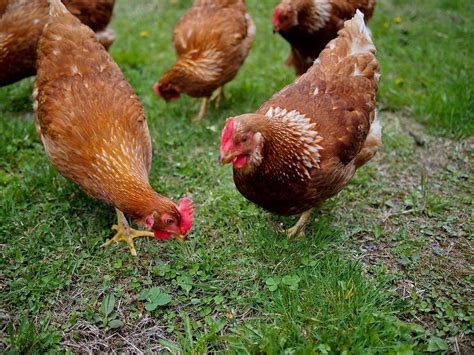In the realm of sustainable living, many individuals yearn for a sense of self-sufficiency, a connection to the land, and a return to traditional practices. As this movement gains momentum, aspirations of tending to a small flock of birds take root and flourish. The prospect of bringing chickens into one's home symbolizes the desire to embrace a simpler lifestyle, where the fruits of one's labor, quite literally, lay at their feet.
By fostering a genuine tie to our agricultural heritage, the choice to embark on this poultry-powered journey represents a key steppingstone towards attaining self-reliance. The clucks and crowing that herald the dawn become the soundtrack to a homesteader's life, echoing the rhythms of the past and underscoring the primal connection between humans and their animal counterparts. The resounding call of the rooster at daybreak serves as a symbol of hope, reminding us of the sun's promise and the rich possibilities that lie ahead.
It's not just about embracing an idyllic picture-postcard ideal, but rather about finding harmony within the natural world. With each day spent in the company of chickens, a profound appreciation for the cycles of life and the intricate web of interdependence becomes woven into the fabric of our existence. As these feathered creatures scratch, peck, and forge their own paths amidst the soil, they teach us invaluable lessons in resilience, resourcefulness, and the need to nurture and protect those entrusted to our care.
The Pleasures of Raising Backyard Chickens

Discover the countless joys and benefits of nurturing and caring for your own flock of feathered friends right in your backyard. This section explores the unparalleled rewards that come with raising chickens and highlights the invaluable experiences they bring into your life.
- Connection with nature: Embrace the primal connection with the natural world as you observe the daily routines and behaviors of your chickens.
- Sustainable living: Experience the fulfillment of sustainable living by producing your own fresh, organic eggs, reducing your carbon footprint, and minimizing food waste through chicken composting.
- An educational journey: Engage in a never-ending educational journey with your children or yourself as you learn about the life cycle, biology, and true nature of chickens.
- Source of entertainment: Delight in the endless entertainment provided by these quirky and fascinating creatures through their comical antics and unique personalities.
- Therapeutic effects: Revel in the therapeutic benefits of gardening alongside your chickens, as their presence creates a serene and calming environment that helps alleviate stress and anxiety.
- Connection to the community: Foster a sense of community and connection by sharing the surplus eggs and knowledge gained from your chickens with neighbors, friends, and fellow enthusiasts.
Embarking on the journey of raising backyard chickens opens up a world of excitement, enlightenment, and fulfillment. Whether for sustainable living, educational purposes, or simply for the sheer joys they bring, these feathered companions will undoubtedly enrich your life in ways you never could have imagined.
Explore the Enriching Benefits of Cultivating Your Own Poultry Herd
Delve into the remarkable advantages that come with nurturing and raising your own flock of poultry. Discover the profound sense of fulfillment and self-sufficiency that accompanies this rewarding endeavor. By having your own feathered companions, you are granted the opportunity to experience the joys of responsible stewardship and sustainable living firsthand.
Whether you opt for chickens, hens, or roosters, the rewards of keeping a poultry herd are abundant. Raising poultry provides a unique sense of connection to nature as you witness the fascinating lifecycle of these resilient creatures right in your own backyard. Their diverse personalities and gentle disposition offer endless entertainment and serve as a reminder of the enchanting beauty of the animal world.
Not only does raising your own chickens contribute to a more sustainable lifestyle, but it also provides a reliable source of fresh, nutritious eggs. With a flock of your own, you can ensure the quality and freshness of your eggs while being able to enjoy the unparalleled flavor that comes from organic, farm-to-table produce. The empowerment and satisfaction of providing for yourself and your loved ones cannot be overstated.
- Cultivate a healthier and more sustainable lifestyle
- Gain a deeper connection with nature
- Enjoy the captivating personalities of chickens
- Provide your family with fresh and nutritious eggs
- Experience the satisfaction of self-sufficiency
- Reduce your ecological footprint
- Embrace the simplicity and tranquility of life on a homestead
In conclusion, embarking on the journey of cultivating your own poultry flock brings about a multitude of enriching benefits. From fostering a greater sense of self-reliance to enjoying the beauty of nature, and from savoring the taste of freshly laid eggs to reducing your impact on the environment, the rewards are immeasurable. Take the first step towards creating your very own sustainable oasis and prepare to be amazed by the extraordinary life and fulfillment that comes from raising chickens on your homestead.
Getting Started: Essential Steps in Building Your Homestead

If you have been dreaming about creating your own self-sustaining paradise, then building a homestead is the perfect way to turn those dreams into a reality. In this section, we will explore the fundamental steps you need to take to embark on your homesteading journey and create a harmonious haven for yourself and your family.
- Define Your Homesteading Goals: Before starting, it's important to clearly define what you want to achieve with your homestead. Are you looking to grow your own food, raise livestock, or become completely self-sufficient? Understanding your goals will guide your decisions throughout the process.
- Find the Perfect Homestead: Location is key when homesteading. Look for land that fits your needs, whether it's a small urban lot or a vast rural property. Consider factors such as climate, soil quality, and proximity to essential resources like water and markets.
- Plan for Sustainable Agriculture: Building a sustainable food supply is crucial. Start by designing your garden or orchard layout, selecting suitable crops and plants, and planning for year-round production. Consider implementing organic and permaculture practices to minimize environmental impact.
- Build a Livestock Infrastructure: If raising animals is part of your homesteading vision, invest time and resources in constructing suitable housing and fencing. Research the specific needs and regulations for the livestock you are interested in, whether it be chickens, goats, or even bees.
- Master Essential Homesteading Skills: Developing a wide range of practical skills is vital for successful homesteading. Learn about gardening, animal husbandry, food preservation, and basic carpentry. Acquiring these skills will empower you to embrace a self-reliant lifestyle.
- Create Efficient Water Systems: Access to clean water is critical for any homestead. Consider installing rainwater harvesting systems, digging a well, or utilizing natural water sources. Efficient irrigation methods and water conservation practices will help sustain your plants and animals.
- Prioritize Energy Independence: Homesteading often involves reducing dependence on external energy sources. Explore renewable energy options such as solar panels, wind turbines, or hydroelectric systems. Implementing energy-efficient practices will not only benefit your homestead but also the planet.
- Connect with the Homesteading Community: Building a network of like-minded individuals can provide valuable support and inspiration. Attend workshops, join local homesteading groups, and participate in online forums to share knowledge, exchange ideas, and learn from experienced homesteaders.
Embarking on your homesteading journey may seem daunting at first, but by following these essential steps, you will be well on your way to creating a sustainable and fulfilling lifestyle. Remember, homesteading is a continuous learning process, so be open to experimentation, adapt to challenges, and enjoy the rewarding journey towards self-sufficiency.
Embark on your path towards self-reliance
Discover the empowering journey of becoming self-sufficient and taking control of your own sustenance. Explore the remarkable potential that lies within the pursuit of homesteading, as you learn to embrace a life filled with self-sufficiency and the joys of nurturing your own resources.
Unlock the secrets of self-reliance
Take the first steps towards a more sustainable future by gaining the knowledge and skills necessary to embark on your personal journey towards self-sufficiency. Explore the various facets of homesteading, from gardening and permaculture to animal husbandry and food preservation techniques.
Embrace independence and resilience
By cultivating self-sufficiency, you will witness the transformative power of being in control of your own nourishment and provisions. Enhance your understanding of the interconnectedness of nature and the vital role it plays in sustaining a self-reliant lifestyle. Develop the ability to adapt and thrive in diverse environments, while reducing your reliance on external systems.
Nurture a sense of stewardship
Embarking on the path towards self-sufficiency instills a deep sense of responsibility and connection to the land. Experience the gratification of not only providing for yourself and your loved ones but also contributing to the preservation of our planet's natural resources. Foster a strong bond with the earth as you actively engage in sustainable practices and promote a healthier, more balanced ecosystem.
Join a supportive community
Enter a vibrant community of like-minded individuals passionate about self-sufficiency and homesteading. Benefit from the wealth of knowledge and collective wisdom shared amongst fellow homesteaders. Connect with individuals who understand the unique challenges and rewards of this lifestyle, offering guidance and support as you progress on your journey.
Embarking on your personal journey towards self-sufficiency is a transformative endeavor that promises to broaden your horizons, strengthen your connection to the earth, and empower you to live a more sustainable and fulfilling life. Take the first step today and set yourself on a path towards self-reliance and homesteading!
Transitioning from a Simple Hobby to a Fulfilling Homesteading Lifestyle

Embarking on a homesteading journey often begins with a simple fascination and passion for the natural world around us. As these dreams take root and grow stronger, many find themselves drawn to the idea of integrating chickens into their sustainable lifestyle. Beyond being just a hobby, homesteading with chickens offers a rewarding and self-sufficient way of life that goes beyond mere ownership. It is a path towards independence, connection with nature, and a deeper understanding of sustainable practices.
When we transition from casually owning chickens to embracing a homesteading lifestyle that revolves around these incredible animals, we embark on a transformative journey. We tap into our primal instincts and reconnect with the true essence of self-sufficiency and living off the land. The beauty of homesteading with chickens lies in the seamless integration of these fascinating creatures into our daily lives, as they become an integral part of our sustainable ecosystem.
Homesteading with chickens is not just about tending to a few hens in a backyard coop; it entails a holistic approach to our entire way of life. From caretaking and nurturing to harvesting their eggs and enjoying fresh, nutritious poultry, every aspect of homesteading with chickens brings us closer to nature and offers valuable lessons in sustainability, resourcefulness, and resilience.
By cultivating a deep bond with our flock, we not only gain a constant source of food and companionship but also develop a profound appreciation for the interconnectedness of all living things. The self-sufficiency that chickens provide can be a stepping stone towards a more sustainable future, as we reduce our reliance on external systems and discover the satisfaction of producing our own food.
Homesteading with chickens encourages us to live in harmony with the rhythms of nature and to adopt practices that prioritize the health and well-being of our feathered friends. It requires careful planning and consideration for their habitat, diet, and overall welfare. As we immerse ourselves in this lifestyle, we learn to embrace the challenges and rewards that come hand in hand with being stewards of the land and caretakers of these remarkable creatures.
FAQ
What are the benefits of owning chickens?
Owning chickens has numerous benefits. Firstly, they provide a sustainable source of fresh eggs, which can significantly reduce grocery bills. Secondly, chickens can help control pests in the garden by eating insects and bugs. Additionally, chicken manure is an excellent natural fertilizer for plants. Finally, chickens can be great companions and provide a sense of fulfillment and connection to nature.
How much space do chickens need?
Chickens require adequate space to live comfortably. As a general rule, each chicken should have at least 4 square feet of coop space and 10 square feet of outdoor space. However, larger breeds may need more space. It is important to ensure that the coop and outdoor area are secure and well-protected from predators.
What do chickens eat and how much does it cost to feed them?
Chickens have a diverse diet and can eat a variety of foods. A standard chicken feed, which is a mixture of grains, is a staple in their diet. In addition to that, they can have access to garden scraps, bugs, worms, and kitchen leftovers. The cost of feeding chickens can vary depending on the size of the flock and the type of feed purchased. On average, a chicken may consume around 1/4 pound of feed per day, so it is essential to budget accordingly.
What is the initial cost of setting up a chicken coop?
The cost of setting up a chicken coop can vary depending on the size and quality of materials used. On average, a basic coop can cost around $200-$300. This includes the cost of materials such as wood, wire mesh, roofing, and hardware. Additional expenses may include nesting boxes, perches, and other accessories. It is essential to invest in a well-constructed coop to ensure the safety and comfort of the chickens.



